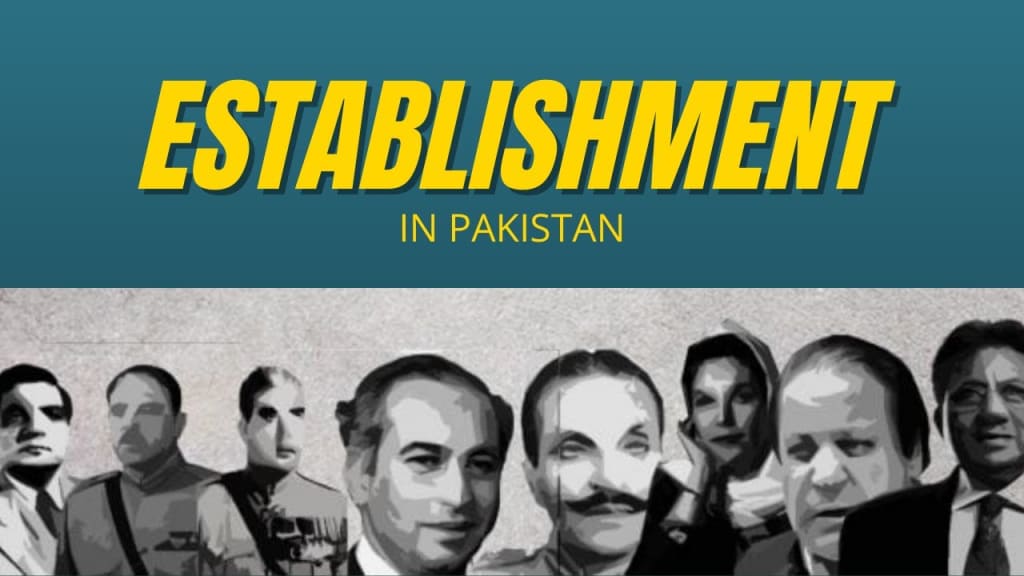Why Establishment is a Poison for Pakistan
Responsibility for Instability and Enjoying Luxury Life

Pakistan, a country with a population of more than 200 million people, has been in the grips of instability for a long time. Despite the efforts of successive governments, the country has not been able to achieve sustainable economic development. While many factors contribute to this state of affairs, one factor that is often overlooked is the role of the Establishment.
The Establishment is a term used to describe the military and intelligence agencies of Pakistan. These organizations have played a dominant role in the country's politics since its inception. Although Pakistan has experienced periods of democracy, military rule has been the norm for most of its history. While the military has provided stability during periods of political turmoil, its presence has also been a major cause of instability in the country.
The Establishment has been responsible for the suppression of democratic institutions in Pakistan. Whenever democracy has threatened to gain a foothold, the military has intervened to prevent it from taking root. The military has also been responsible for the suppression of political dissent, with many political activists being arrested and tortured by intelligence agencies.
One of the most significant effects of the Establishment's dominance has been the lack of economic development in the country. Although Pakistan has immense potential for economic growth, the country has not been able to achieve its full potential due to the military's control over the economy. The military's involvement in business has created a system of crony capitalism, where only those who have connections with the military can succeed in business. This has stifled entrepreneurship and prevented the growth of small businesses, which are the backbone of any thriving economy.
Moreover, the military's control over the economy has also led to the misallocation of resources. The military's budget is so large that it consumes a significant portion of the country's resources, leaving little for investment in other sectors. This has led to a lack of investment in infrastructure, education, and healthcare, which are crucial for economic development.
Another issue that has arisen due to the Establishment's control over the economy is the widening gap between the rich and the poor. While the military elite enjoys a life of luxury, the majority of the population struggles to make ends meet. The Establishment has created a system where the wealthy are favored, and the poor are left to fend for themselves.
Furthermore, the Establishment's dominance has also led to the stifling of creativity and innovation in the country. The military's control over the media has prevented the free flow of ideas, and the lack of intellectual freedom has hampered scientific and technological progress. As a result, Pakistan has fallen behind many other countries in terms of innovation and technological advancements.
How They control Media?
The Establishment in Pakistan, including the military and intelligence agencies, has been known to exert control over the media through a variety of means. Some of the ways in which they control the media include:
1. Direct censorship: The military and intelligence agencies in Pakistan have been known to directly censor media content that is critical of their actions or that they deem to be against their interests. This can involve issuing threats, shutting down media outlets, or putting pressure on journalists to change or retract their reporting.
2. Indirect censorship: The Establishment can also exert control over the media indirectly, by controlling the advertising revenue that media outlets rely on for their survival. By withholding advertising revenue or providing it only to media outlets that are favorable to their interests, the Establishment can influence the content of the media without directly censoring it.
3. Intimidation and harassment of journalists: Journalists who are critical of the Establishment in Pakistan are often subject to intimidation and harassment, including physical violence, threats, and harassment by intelligence agencies. This can create a climate of fear that discourages journalists from reporting on sensitive issues or being critical of the Establishment.
4. Ownership of media outlets: The Establishment in Pakistan also controls some media outlets through ownership or indirect control. This allows them to shape the narrative in their favor and suppress dissenting voices.
5. Self-censorship: Due to the fear of retaliation or violence, many journalists and media outlets in Pakistan practice self-censorship. This means that they avoid reporting on sensitive issues or being critical of the Establishment, even if they believe it is in the public interest.
How they control Judges?
The Establishment in Pakistan, including the military and intelligence agencies, has been known to exert control over the judiciary through a variety of means. Some of the ways in which they control judges include:
1. Appointment of judges: The Establishment in Pakistan plays a significant role in the appointment of judges to the higher judiciary. This allows them to influence the composition of the judiciary and ensure that individuals who are sympathetic to their interests are appointed.
2. Intimidation and harassment of judges: Judges who are seen as a threat to the interests of the Establishment in Pakistan may be subject to intimidation and harassment, including threats to their personal safety or that of their family members. This can create a climate of fear that makes it difficult for judges to make independent decisions.
3. Covert surveillance: The Establishment in Pakistan may use covert surveillance to monitor the activities of judges and gather information that can be used to exert control over them. This can include monitoring their communications, tracking their movements, and gathering information about their personal and professional lives.
4. Influence over court proceedings: The Establishment in Pakistan may use its influence to shape court proceedings and ensure that judgments are delivered in their favor. This can involve pressuring judges to rule in a certain way, or using other means to influence the outcome of court proceedings.
5. Impeachment or removal of judges: Judges who are seen as a threat to the interests of the Establishment in Pakistan may be subject to impeachment or removal from office. This can be done through legal means, such as the filing of impeachment petitions or removal proceedings, or through illegal means, such as threats or intimidation.
How they select Ministers and President?
The Establishment in Pakistan, which includes the military and intelligence agencies, has been known to influence the selection and appointment of key political leaders in the country. Some of the ways in which they control the appointment of prime ministers, ministers, and presidents include:
1. Backing certain political parties or candidates: The Establishment in Pakistan may support certain political parties or candidates in elections, either overtly or covertly, in order to ensure that they have a say in the selection of the prime minister or president.
2. Pressuring political leaders to appoint certain individuals: The Establishment in Pakistan may exert pressure on political leaders to appoint certain individuals to key positions, such as ministerial posts or the presidency. This can be done through direct or indirect means, such as through threats or promises of support.
3. Blackmailing political leaders: The Establishment in Pakistan may use information or evidence that they have gathered through covert surveillance or other means to blackmail political leaders into appointing certain individuals to key positions.
4. Influencing the electoral process: The Establishment in Pakistan may use their influence to manipulate the electoral process in order to ensure that certain candidates are elected or that certain parties win elections.
5. Direct intervention: In some cases, the Establishment in Pakistan may directly intervene in the political process to ensure that their preferred candidate or party comes to power. This can involve the use of force, such as in the case of military coups or other forms of political violence.
In conclusion, the Establishment's dominance has been a poison for Pakistan. It has been responsible for the suppression of democratic institutions, the lack of economic development, the widening gap between the rich and the poor, and the stifling of creativity and innovation. While stability is essential for any country, it cannot come at the cost of democracy, economic development, and the well-being of the majority of the population. It is time for Pakistan to break free from the grip of the Establishment and embrace democracy and economic development. Only then can the country realize its full potential and provide a better future for its people.
About the Creator
Muhammad Sarib Ali
Sarib is an experienced Content Writer with 5 years of experience in the CNet industry. He is a creative and analytical thinker with a passion for creating high-quality content and crafting compelling stories.






Comments
There are no comments for this story
Be the first to respond and start the conversation.